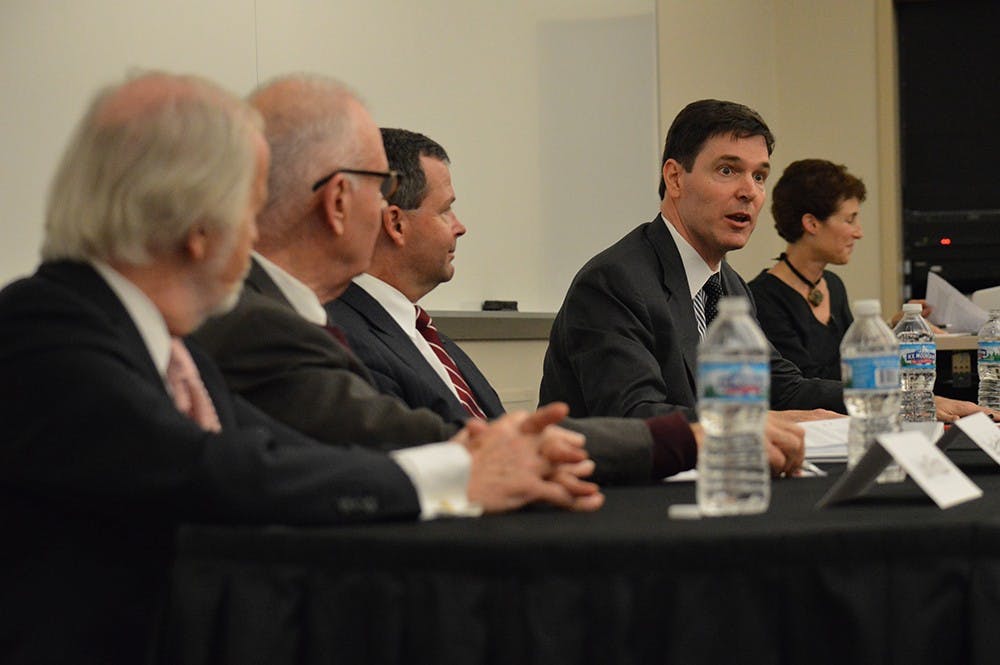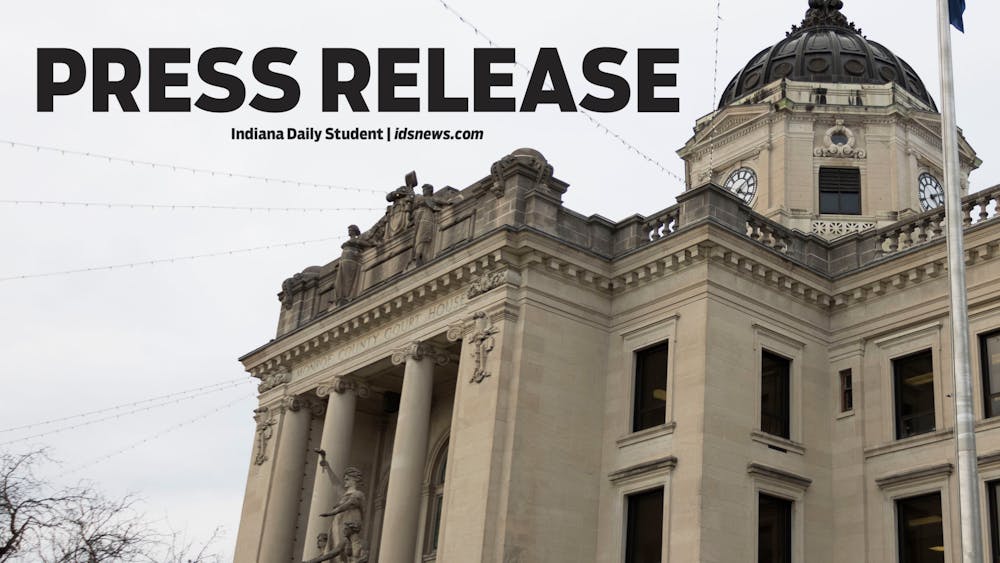Friday’s “Question Authority: Congress, the CIA and You” discussion panel was co-sponsored by the School of Public and Environmental Affairs Law and Public Policy Program, the Maurer School of Law, the School of Global and International Studies and the Hutton Honors College.
Speakers included former CIA chief counsel, John Rizzo; 9/11 Commission Co-Chair and former U.S. Rep. Lee Hamilton, D-9th District; and former Baghdad Judge Advocate, Jeffrey Spears.
Led by SPEA associate professor Beth Cate and Middle East legal expert Nick Connon, speakers explored the legal and ethical implications of a variety of factors shaping U.S. engagement in the Middle East, including the Islamic State of Iraq and Syria, torture, drones and data leaks.
Throughout his 34-year career with the CIA, during which he served 11 CIA directors and seven presidents, Rizzo was involved with some of the organization’s most historically significant operations to date. This included the CIA’s implementation of enhanced interrogation techniques following 9/11 as well as its use of drone technology against enemy forces.
“Apparently there was, for many years at least, a decision made that it is more lethally justifiable and morally acceptable to stalk and kill a terrorist than it is to stalk and capture and aggressively interrogate a terrorist,” Rizzo said. “It’s an anomaly that I was never quite able to resolve in my mind.”
From a military perspective, Spears said drones have certain set of advantages when compared with traditional offensive methods, such as the use of bombs or deployment of U.S. troops.
“If you knew that you had a compound that had strategic enemy forces in it, in World War II you might have used several bombers to bomb that entire area,” Spears said. “That would have resulted in a significant amount of collateral damage.”
Spears said as a combatant, under the Geneva Conventions, the military is obligated to look for the least potentially harmful way to engage a target and minimize civilian casualties.
“I think what we’ve seen over time through the use of technology is that instruments such as a drone armed with different types of weapons systems, I think, are very capable of reducing the potential, but not limiting, of collateral damage,” Spears said.
Although he agrees that drones can be useful when dealing with complicated problems, Hamilton said it is important to remember some of the larger implications of the drone program.
“The president has the ability to kill anyone, any time, based on criteria that is secret,” Hamilton said. “Discussions go forward in a closed process by individuals you cannot name, nor can I.”
Hamilton’s greatest concerns regarding the drone program, which he said can be very sterile, is the accountability and transparency of those who control it.
“The administration is very secretive on this drone program,” Hamilton. “I want to see a process that gives us a little more information than we now have about the drone program.”
Panelists also discussed the way in which interactions between congress and the intelligence community can often be challenging.
“The relationship between the CIA and Congress is complicated, to say the least,” Rizzo said. “Historically complicated and institutionally complicated.”
Hamilton said one of the main cause of discord between Congress and the intelligence community is the different set of rules that govern each entity.
“Representative democracy demands openness, transparency, accountability, at least it should,” Hamilton said. “In the intelligence area, you cannot be open completely and transparent, you do have a lot of secrets that are very important to keep.”
Though he said he has the utmost respect for CIA professionals and appreciates the difficulty of the tasks they face, Hamilton said he is skeptical of the organization’s political appointees.
“Too often they tell the president of the United States what the president of the United States wants to know,” Hamilton said. “I can only remember two to three times, in a long career, where the intelligence officials came into the Oval Office and said, ‘Mr. President, you’re wrong.’”
On the other hand, Hamilton said Congress could, and should, be doing more to engage the intelligence community.
“I don’t think that congress does a very good job of oversight of the intelligence community,” Hamilton said. “It’s not robust enough, it’s not tough enough, it doesn’t ask the hard questions of the witnesses who come before it.”
However, because both of these entities deal with policy questions that concern everyone in the public domain, the panelists agreed that effective, open communication between the two is imperative.
“There has to be more political accountability, there has to be more oversight,” Hamilton said. “Not just in the executive branch, but in the legislative branch as well.”






